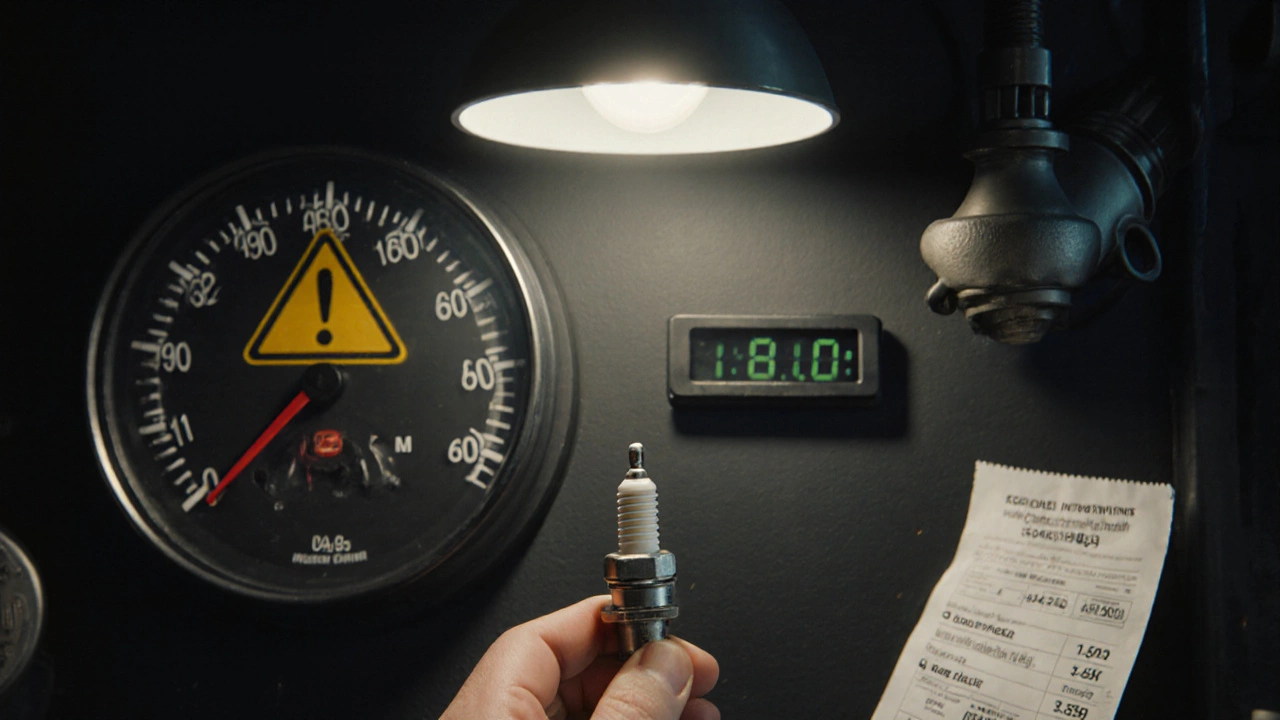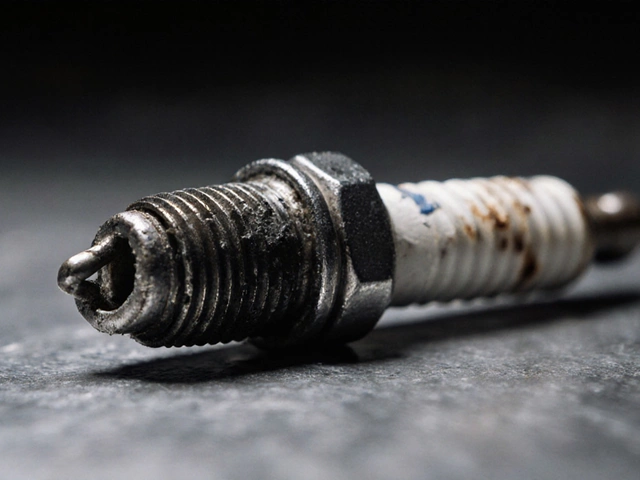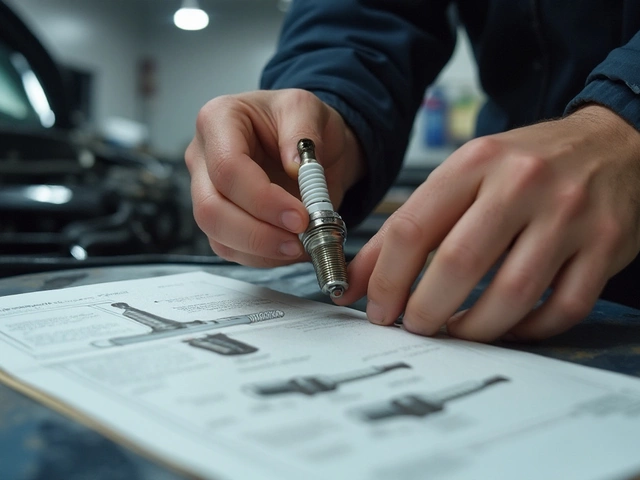Spark Plug Replacement Calculator
Enter Your Vehicle Details
Your Results
Annual Fuel Savings
£0
If you replace your spark plugs now
Potential Repair Costs
£0
If you wait for failure
Recommended Action
Replace Now
Based on your driving habits
Most car owners hear the advice: "Replace your spark plugs every 30,000 to 100,000 miles." But if your engine runs fine, idles smooth, and gets good fuel economy, why bother? It’s a fair question. You’re not losing power. No check engine light. No misfires. So why spend money on something that doesn’t seem broken?
Spark plugs don’t fail suddenly-they wear out slowly
Unlike a blown fuse or a dead battery, spark plugs don’t quit with a bang. They fade. Over time, the electrodes wear down. The gap between them widens. The ceramic insulator gets coated in carbon or oil. You won’t feel it until the engine starts struggling. By then, you’ve already lost efficiency.
A 2023 study by the Society of Automotive Engineers tracked 1,200 vehicles over five years. Cars with spark plugs older than 120,000 miles saw a 7% drop in fuel economy-even with no obvious symptoms. That’s like paying an extra £15 every time you fill up. For a car doing 12,000 miles a year, that’s £180 a year wasted just because the plugs were still "working."
Modern spark plugs last longer than older ones. Platinum and iridium tips can go 100,000 miles or more. But "can" doesn’t mean "should." Waiting until something breaks is like waiting for your brakes to squeal before replacing them. You’re gambling with performance, cost, and emissions.
What happens when spark plugs get too old?
Even if your car feels fine, worn spark plugs cause hidden damage:
- Incomplete combustion: Weak sparks don’t burn fuel fully. Unburned fuel enters the exhaust, overheating the catalytic converter. Replacing one costs £500-£1,200.
- Increased emissions: Your car fails its MOT more easily. In the UK, a faulty ignition system is one of the top three reasons for MOT failure.
- Engine misfires: These are sneaky. Sometimes they happen only under load-like when climbing a hill or accelerating on the motorway. You might just think the car is "feeling sluggish."
- Hard starting: Cold mornings get tougher. The starter motor works harder, draining your battery faster.
One mechanic in Manchester told me about a customer who drove a 2018 Honda Civic for 140,000 miles without changing the plugs. The car ran fine-until it didn’t. One morning, it wouldn’t start. Turned out the electrodes were so worn the spark couldn’t jump the gap. The battery was fine. The fuel pump was fine. Just the plugs. Replacement cost £80. The tow truck cost £120.
When should you actually change them?
Your owner’s manual is your best friend. Most manufacturers recommend replacement between 60,000 and 100,000 miles. But here’s the catch: that’s the maximum interval-not the target.
For most drivers in the UK, a better rule is this:
- If you drive mostly short trips (under 5 miles), change them at 60,000 miles. Short trips don’t let the engine reach full operating temperature. That lets carbon build up.
- If you drive mostly motorway miles, you can stretch to 80,000-90,000 miles.
- If your car has a turbocharged engine, stick to 60,000-70,000 miles. Higher cylinder pressures wear plugs faster.
And don’t ignore time. Even if you’ve only driven 40,000 miles in 8 years, replace the plugs. Rubber seals dry out. Metal corrodes. Spark plugs don’t like sitting idle.

What about "if it ain’t broke, don’t fix it"?
This mindset saves money in the short term-but costs more long-term. Think of it like changing your oil every 10,000 miles instead of 5,000. You might get away with it for a while. But the engine pays the price.
Spark plugs are cheap. Labour isn’t. On most cars, replacing spark plugs takes 1-2 hours. Labour costs around £60-£100 in the UK. The plugs themselves? £20-£50 for a full set. Total: under £150.
Compare that to:
- Replacing a damaged catalytic converter: £800+
- Repairing a misfire that damaged the cylinder: £1,500+
- Failed MOT because of emissions: £100 retest fee + repair costs
It’s not about fixing what’s broken. It’s about preventing what will break.
How to tell if your plugs are worn before the schedule
You don’t need to wait for a breakdown. Here are five quiet signs your spark plugs are on their way out:
- Fuel economy drops by 5-10%: Track your mpg over three tanks. If it’s trending down, check the plugs.
- Engine hesitates on acceleration: Not a full misfire-just a slight lag when you press the pedal.
- Hard starting in cold weather: If your car used to start on the first turn, now it cranks for a second or two, the plugs are tired.
- Check engine light flashes: Flashing means a misfire. Don’t ignore it. It’s often spark plug related.
- Engine sounds rough at idle: A smooth idle is quiet. A rough idle sounds like the engine is coughing.
If you notice any of these, don’t wait. Pull the plugs. You’ll see the wear yourself-the rounded electrodes, the dark crust, the wide gap. A simple gap gauge costs £5.
Is it worth doing it yourself?
Yes-for most cars. Spark plug replacement is one of the easiest DIY jobs. You need:
- A spark plug socket (usually 5/8" or 13/16")
- A torque wrench (critical-over-tightening cracks the threads)
- New spark plugs (match the exact type in your manual)
- Anti-seize compound (for aluminium heads)
YouTube has clear videos for your exact model. Take your time. Don’t rush. Remove one plug at a time. Clean the area around each well with compressed air or a brush before pulling the old plug. If you cross-thread a new one, you’re looking at a cylinder head repair-costing £1,000+.
Most people can do it in 90 minutes. Save £80 on labour. And you’ll know your car is running right.
Bottom line: Replace them before they fail
Just because your car feels fine doesn’t mean your spark plugs are fine. They’re working harder than you think. They’re silently wasting fuel, increasing emissions, and slowly damaging expensive parts.
Changing spark plugs isn’t about fixing a problem. It’s about protecting your investment. It’s cheap insurance. And in the UK, where fuel prices stay high and MOTs are strict, it’s one of the smartest maintenance moves you can make.
Don’t wait for the engine to complain. Don’t wait for the check engine light. Don’t wait for the MOT failure. If your car is approaching the manufacturer’s recommended interval, just do it. Your wallet, your engine, and the air you breathe will thank you.
Do I need to change spark plugs if my car runs fine?
Yes. Even if your car runs smoothly, worn spark plugs reduce fuel efficiency, increase emissions, and can damage your catalytic converter over time. They don’t fail suddenly-they wear down slowly. Replacing them before they cause damage saves money and prevents bigger repairs.
How often should spark plugs be replaced?
Most manufacturers recommend replacement between 60,000 and 100,000 miles. For drivers who mostly do short trips, replace them at 60,000 miles. For motorway-heavy drivers, 80,000-90,000 miles is usually fine. Turbocharged engines need replacement closer to 60,000-70,000 miles. Never ignore time-replace them after 8 years even if mileage is low.
Can old spark plugs cause an MOT failure?
Yes. Faulty spark plugs can cause misfires, which lead to excessive emissions. This is one of the top three reasons for MOT failures in the UK. A failed emissions test means a retest fee and repair costs, which often exceed the price of new spark plugs.
What happens if I don’t change my spark plugs?
Worn spark plugs cause incomplete combustion, which leads to unburned fuel entering the exhaust. This overheats and damages the catalytic converter-costing £500-£1,200 to replace. It can also cause engine misfires, hard starts, rough idling, and reduced fuel economy. Long-term neglect risks cylinder damage.
Can I check spark plug condition myself?
Yes. Remove one plug and inspect it. Look for rounded or eroded electrodes, heavy carbon buildup, or oil residue. Use a gap gauge to check the gap-if it’s wider than the manufacturer’s spec, the plug is worn. You can also track fuel economy over time-a drop of 5-10% is a red flag.


